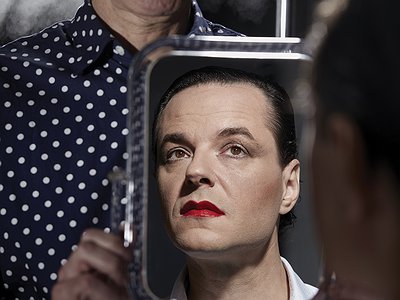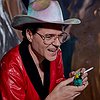There are many descriptions of the ideal state of mind for being creative. What is it like for you? What supports this ideal state of mind and what are distractions? Are there strategies to enter into this state more easily?
I definitely have to set an environment, a special situation which will automatically have an impact on the process. That can be the choice of working methods, how you set the lights for example or the working hours you choose. For me it is good to be as isolated as possible, or as disconnected. In my case, every point of connectivity works as poison towards my own creativity. Disconnection is extremely important.
Also, I need to get rid of all external influences. The worst thing for me would be really thinking about things like a concrete release, or expectations of the public. To have a creative flow you have to fully get rid of the ego and instead, let the music lead you. It’s like being devotional to music. Maybe it’s like gardening, the plants are already there but you have to understand them and treat them carefully so they can flourish. I find setting the bars low is something that triggers imagination, too, being humble, not expecting too much of what you do and just plunging entirely into the process.
I always find making music as a present for someone helpful. To set yourself the task of recording something for someone, and drawing a nice little cover – because it’s something that feels light and free it is very likely to get to surprising results.
Also influencing yourself on other levels helps, like following a certain diet, during the time you’re working on a specific project. There was an album where I chose to listen only to the music of Charles Mingus and nothing else in the. The result didn’t sound like Mingus at all but it was a good way of keeping focussed and not being distracted by too many stimulations, or the contamination of too many sounds.
How is playing live and writing music in the studio connected? What do you achieve and draw from each experience personally? How do you see the relationship between improvisation and composition in this regard?
The live situation and the studio situation are very connected. It is a dialog that takes place there. I often start something in the studio and then try it out live, where I get a much clearer sense of the music “in action”. It helps me to develop it further when I take it back to the studio. Not playing my music out seems to me like standing by a lake and thinking of swimming techniques.
Many things I’ve improvised on stage I have then developed further in the studio. For me this back and forth is very essential.
My compositions mostly adapt themselves to improvisations. I make a lot of takes that at first are improvised but then gradually take shape. I haven’t achieved very satisfying results working on arrangements in the sense of classic “writing”. But who knows, maybe in the future…
How do you see the relationship between the 'sound' aspects of music and the 'composition' aspects? How do you work with sound and timbre to meet certain production ideas and in which way can certain sounds already take on compositional qualities?
In my process Is see a direct connection between sound and composition. There’s an approach in the vocal sound for example, in the voice in “Sofarnopolis”. It started while doing the first drafts using an old MD 441 Sennheiser mic, a tube preamp and a “wow and flutter delay” by Snazzy FX. I used the effect on one side of the headphones so I could hear my dry voice, too, and I played with the sound aesthetically and also rhythmically and mood-wise, a very short slap-back delay, which inspired me to sing in a more forceful but contained way on a track called “Supreme”. It took me to a way of singing that I associate with late ‘50s / early ‘60s music.
Sounds very much set the mood of things. While most sound engineers tell you to record dry signals and effects separately for more flexibility in the mix later – we also like to record the sound with the effects in it, so we have no choice but to stick to the original mood that’s always so difficult to recreate.
I was with a friend who had worked with a sound engineer or producer to record her music and she told me that she wasn’t too happy with the result as it sounded too clean and not so fresh as the drafts. Then she told me the producer told her she’s suffering from “drafteritis” or “sketcheritis”. I don’t know what word he made up trying to express that she was clinging to the mood of the initial ideas. This is a way of thinking that is very far away from how I work. I actually always try to go back to the initial recording so I don’t lose the motivation that actually made the idea strong. I always go back to check if we have lost something on the way which can easily happen if you work for a long time on a track. I rarely use the draft recordings but what I do use ends up sounding pretty much like the mood of the initial recordings.
Our sense of hearing shares intriguing connections to other senses. From your experience, what are some of the most inspiring overlaps between different senses - and what do they tell us about the way our senses work? What happens to sound at its outermost borders?
Well, I sometimes wonder if one could add dreaming as an extra sense, as I have the impression that the logic of dreams is not really translatable in sound or vision.
I was always sceptical of the idea of synaesthesia as I always thought that the invisibility of music is one of its strengths. Opposed to Disney’s Fantasia or Wagnerian Gesamtkunstwerk dreams I was more attracted by the idea of “montage” or “Verfremdung”, to contrast music with an image in a way that a new space for interpretation opens up. Instead of closing the freedom of the mind with a one-way street which in the end always means music submitting to image – when the image tries to become a translation of music.
I am under the impression that in the ways I access sounds and especially the thing in music that you don’t hear, it’s this that carries me to this sensorial adventure that’s like dreaming. There is a lack of a depiction or concretization, but it’s this very thing that seems to hold everything together. It’s this space that is there when you don’t remember a dream but feel it’s presence and the real impact on you, albeit it having taken place in “real life”.
Art can be a purpose in its own right, but it can also directly feed back into everyday life, take on a social and political role and lead to more engagement. Can you describe your approach to art and being an artist?
I assume I’d have a very hard time coping without creating or getting into the state of creating and recording etc, so in a way it starts from a very personal and unambitious approach, it’s just what I’ve always been doing. But I see music also as a very efficient tool to concretely express yourself against normatives that are there and that keep you from being free. Music can somehow express this freedom of mind.
There is something like peer pressure that makes many people want to “belong” to a certain school of thought, or genres, or clique etc. I’ve been observing that my whole life. And today, in the most underground context, the mechanisms of market-mentality and its competitiveness, and pressure to conform force people to make a brand out of themselves and play by rules. English as a common language, the mother language of capitalism, amplifies the pressure to be part of a norm. And in music, the result doesn’t even “sound” commercial. Playing by the rules of the segment of the market that you put yourself in, can nowadays result even in very odd or “weird” music. But only as long as it respects the aesthetical boundaries of its genre.
Where I am involved musically, I always to be against, what in Germany you call “Spiessertum”. Which translates as a conservative petit bourgeois closed-mindedness – or conformity.
Musical freedom is to not care if everyone’s into 4/4 when you’re into 6/8, to reference bands that don’t form part of the official correct music reference guidebook, to feel free to play champeta in a techno club and to play techno at a tropical party, to not be afraid to play super slow, when everyone plays fast, to focus on cities in the cultural peripheries when everyone looks at western capitals and do free street parties, to release artists others wouldn’t release etc.
With the people I work with, like Avril Ceballos who co–runs Cómeme with me, we try to establish alternatives and give space to diversity in the concrete structures of work around music. We release as many female productions as male, our roster is queer, we work in ways and structures where we try to be more fair and more collaborative. But it is tough, because while you work in music having PoC and especially WoC involved, you notice how much opposition there is towards them coming from the established male, white, power structures. Through working in this context, I have seen the condescending and belittling attitudes coming from male towards female, from white towards brown, etc. in a way that made me radicalise my thoughts. We are not doing enough and that action has to become more concrete, and not stay online, but happen in real life.
It is remarkable, in a way, that we have arrived in the 21st century with the basic concept of music still intact. Do you have a vision of music, an idea of what music could be beyond its current form?
Music keeps us in touch with other times and with ancestors through transmission of techniques and knowledge and repertoire etc… And there is nothing more rewarding than to share your knowledge and experiences in music and at the same time to learn from others. It’s so good to play with someone else, and try to understand someone and get into a dialogue with someone from a very different cultural or social background. My vision for music is that it can keep humanity alive.
In a utopic scenario it would become part of our everyday life, and shed its commercial and social pressure. Sidewalks would become dancefloors and you would have the right to listen and perform music whenever you want and in whatever volume you see fit. Music would automatically develop in surprising ways if the conditions under which it is made change dramatically.



